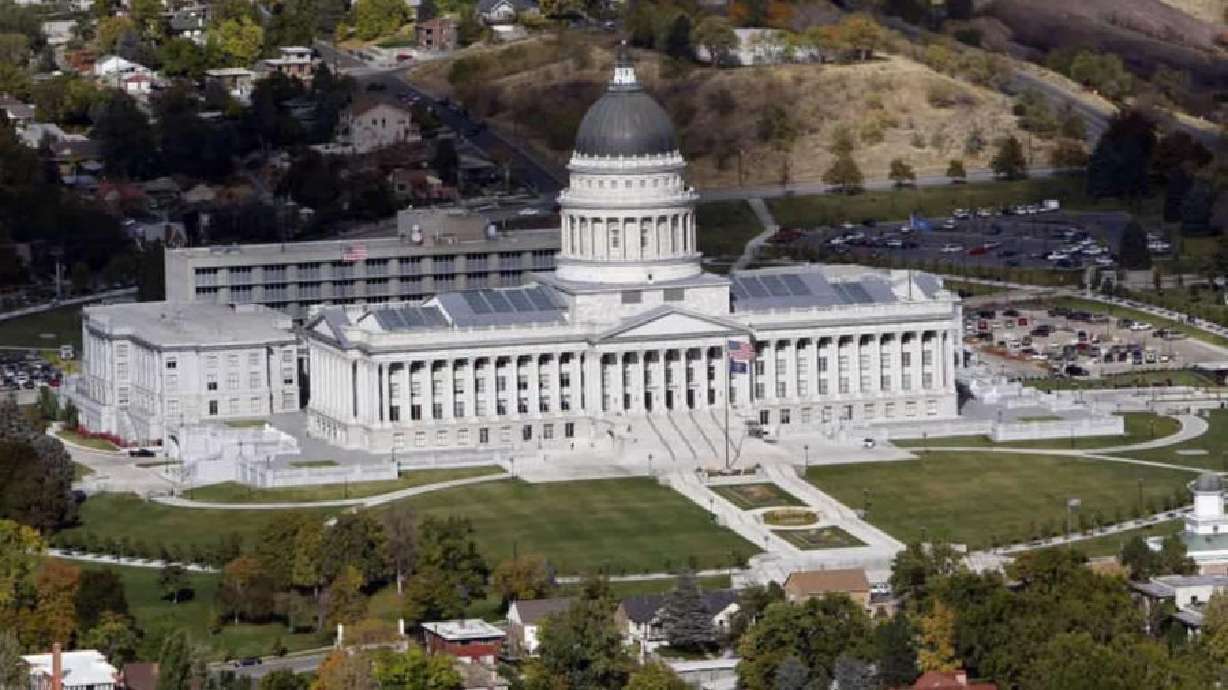Estimated read time: 5-6 minutes
This archived news story is available only for your personal, non-commercial use. Information in the story may be outdated or superseded by additional information. Reading or replaying the story in its archived form does not constitute a republication of the story.
The following story was reported by the Utah Investigative Journalism Project in partnership with KSL.com.
SALT LAKE CITY — The people who run Utah's state agencies are required to disclose possible conflicts of interest. But the governor's office apparently doesn't think the public has the right to know what those are.
In a highly unusual move, the state's Department of Human Resource Management denied a request made in July by the Utah Investigative Journalism Project to obtain copies of conflict-of-interest forms for Cox's cabinet members. who run the agencies that oversee taxes, environmental quality, economic development and more. These agency heads have to file these forms showing their private business interests so Utahns can be confident they are not cashing in on their taxpayer-funded jobs to benefit themselves financially.
The denial was unusual given that experts agree these forms are not only commonly provided upon request but are also designed for the benefit of the public, giving them information to hold public leaders accountable.
Jeff Hunt, a First Amendment attorney at Parr Brown Gee & Loveless and member of the Utah Media Coalition, had never heard of such a decision, calling it "ridiculous."
"What's the point of having conflict-of-interest forms if the public can't see them?" he asked.
After the Department of Human Resource Management first denied the request, Michael Broschinsky, a director at the Utah Department of Government Operations, reversed the decision and agreed to their release, even acknowledging in a July 31 e-mail that the records "were very much in the public interest."
But, two days later, Broschinsky reversed the decision, again, and denied the release of the documents without further explanation.
When asked to comment, Emma Williams, public information officer for the Utah Governor's Office, responded, saying the "governor's office supports DHRM's classification" and the agency's denial of the records.
The Utah Investigative Journalism Project is appealing the denial of the records and the dispute will be heard by the State Records Committee this fall.
'A longstanding practice'
The Department of Human Resource Management in its denial argued the records are private as "personnel records" and that they contain personally identifying information that should not be made public.
Williams said the department classified the records as "private employment records, consistent with longstanding practice."
Hunt said the opposite is true — that the practice has always been to release these records to the public. He also notes that under Utah's Government Records Access and Management Act, or GRAMA, the "personnel records" exemption does not apply to these documents and doesn't specifically identify them as private records.
"Under GRAMA, unless there is a statute that makes these records off limits to the public, then the presumption is that they are public records," Hunt said.
Conflict-of-interest forms are common throughout state and local government. Cox himself posts his personal conflicts online along with all state lawmakers, at Disclosures.Utah.Gov. Any member of the public can download these forms to see if a lawmaker's private work as an attorney or as a real-estate developer, for example, might conflict with the laws they pass and support.
Not only is it common for these documents to be made publicly available, the governor's office has released them in the past.
Cox was challenged about public transparency earlier this year after he supported legislation that would keep lawmakers' calendars from being released to the public. In a virtual townhall, Cox explained that transparency was important to him but in that case argued it was different with lawmakers being "part-time" public officials compared with officials like himself.
"As a statewide elected official, this is my full-time job and that's why I think it's important," he said in regard to his decision to voluntarily release his calendar.
'Very much in the public interest'
David Cuillier, director of the Brechner Freedom of Information Project at the University of Florida, said he wasn't aware of a similar records denial being made anywhere else in the country.
He noted that denying records because they might have personal information like phone numbers or Social Security numbers on them is a weak argument.
"It's kind of public records 101 that if there is certain information in a record that might be exempt by law that they can probably just black that out," Cuillier said. "Just take out a big ol' black marker and cross out the Social Security number — problem solved."
He also agrees the records are of vital importance, not just to journalists but to the public at large.
"People want to know if their politicians are on the up and up and these records help them understand that," he said. "They want to know if their conflicts of interest could override the public interest."
Broschinksy, with the Department of Government Operations that oversees the Department of Human Resource Management, also agreed with both of those points, before changing his mind.
The Department of Human Resource Management initially denied the request on July 15. After the Utah Investigative Journalism Project appealed the decision, Broschinksy directed an employee on July 31 to release the information since it had been provided in the past. He added: "Because conflict of information is very much in the public interest, would you please provide him the forms he has requested? Of course, please redact the necessary information (e.g. home addresses, phone numbers)."
Two days later, Broschinsky changed course.
"I have struggled with this. I've reviewed the records again, and I believe my initial direction to DHRM was a mistake. I'm affirming DHRM's denial of your records request," Broschinsky wrote, providing no further justification for the denial.








